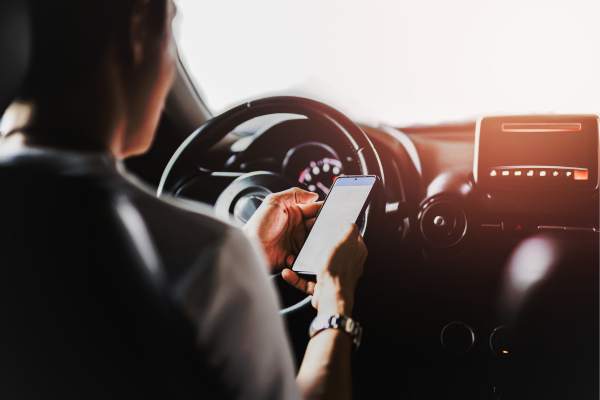Each year, it is estimated that in the United States over 3,000 people die, and over 400,000 people are injured, due to distracted driving. Distracted driving is a critical safety concern on Florida’s roads, posing severe risks to both drivers and pedestrians. As the state continues to deal with the consequences of distracted driving incidents, understanding the dangers, and how to avoid it, becomes important for all motorists.
More Distracted Driving Statistics in Florida
- Distracted driving crashes resulted in 333 fatalities in Florida 2022
- There were 53,596 distracted driving crashes in Florida in 2022
- In 2021, Drivers in the 25-to-34 age group made up 22 percent of drivers in fatal crashes, but were 25 percent of all distracted drivers and 30 percent of drivers distracted by cell phones in fatal crashes.
Florida’s Laws on Distracted Driving
Florida has primarily addressed the issue of distracted driving with a focus on texting while driving. The state implemented a ban on texting while driving in 2019, making it a primary offense for drivers to manually operate a wireless communication device while driving. In fact, law enforcement has the right to initiate a traffic stop solely based on observing a driver texting.
While the texting ban is a good first step, and in today’s world the smartphone takes centerstage, we must keep in mind that distracted driving is broader than just texting.
Causes of Distracted Driving
Understanding the causes of distracted driving will help us to better address the issue.
The primary forms of distracted driving include:
- Texting and Smartphone Use: Smartphones pose a significant distraction. Responding to messages, using social media or using navigation apps, diverts attention away from the road.
- Music/Entertainment Systems: Adjusting settings, selecting music, or using other entertainment features can take a driver’s focus off the road.
- Eating and Drinking: Consuming food or beverages while driving may seem innocent, but it can divert attention away from the road.
- Conversations and Passenger Distractions: Engaging in conversations with passengers or turning attention away from the road to address occupants in the vehicle can also be hazardous.
Consequences of Distracted Driving:
The consequences of distracted driving can be severe, impacting individuals, families, and communities.
Some notable consequences include:
- Traffic Accidents and Fatalities: Distracted driving significantly increases the risk of traffic accidents that can result in injuries and even death. Even a brief lapse of attention can cause enough distraction that leads to a traffic accident.
- Legal Consequences: Violating distracted driving laws in Florida can lead to fines, points on the driver’s license, and potential increases in insurance premiums.
Tips to Avoid Distracted Driving
Several organizations, such as the Florida Department of Transportation, National Highway Traffic Safety Administration, and the American Automobile Association have issued guidelines to educate the public on the dangers of distracted driving.
Here are some useful tips:
- Store or silence your cellphone: Most cellphones include the option of placing the phone in do-not-disturb mode while driving.
- No Alcohol or Drugs: Do not consume any alcohol or drugs prior to driving or while driving. This includes prescription drugs if those drugs include side effects, such as drowsiness.
- Plan Ahead: Plan your route before leaving so you know where you’re going and avoid having to use your phone for routes. If you have to use your phone for directions, purchase a device that affixes to your dash to at least keep the phone in eyesight and towards the roadway.
- Take Breaks: Pull over if you need to complete a task, make a call, or deal with some other distraction while driving.
- Secure Items: Store loose items in your car and be sure to secure pets.
| Age Group | Typical Distractions While Driving | Tips on Staying Alert |
| Teens (16-19) | Mobile phones, loud music, peer passengers | Limit passengers, use phone apps for safe driving, set volume limits |
| Young Adults (20-29) | Texting, social media, in-car entertainment | Enable phone’s driving mode, designate a passenger for navigation, avoid multitasking |
| Adults (30-49) | Phone calls, eating, navigation systems | Utilize hands-free devices, plan meals before driving, program GPS before starting the journey |
| Middle-aged (50-64) | Conversations with passengers, adjusting in-car controls | Focus on road conversations, preset controls before driving, take breaks for extended journeys |
| Seniors (65+) | Medication management, unfamiliar routes | Keep medications organized, plan routes in advance, consider daytime driving |
Need Legal Assistance?
Distracted driving is a pervasive issue that deserves awareness in Florida for the protection of our residents. By understanding the dangers, following existing laws, and educating the public on responsible driving habits, we can contribute to creating safer roads for everyone and thereby reduce the risks associated with distracted driving. If you’ve been injured by a distracted driver, you may be wondering what to do or where to turn. At Gould Cooksey Fennell, we’ve helped many victims recover compensation from accidents that were not their fault. If you would like to talk to an experienced car accident attorney, contact us today.
Gould Cooksey Fennell has adopted the Contingency Fee Contract approved by the Florida Bar. We do not collect a fee unless we make a recovery on your case. Contact us for a free personal injury consultation.
Sources:








